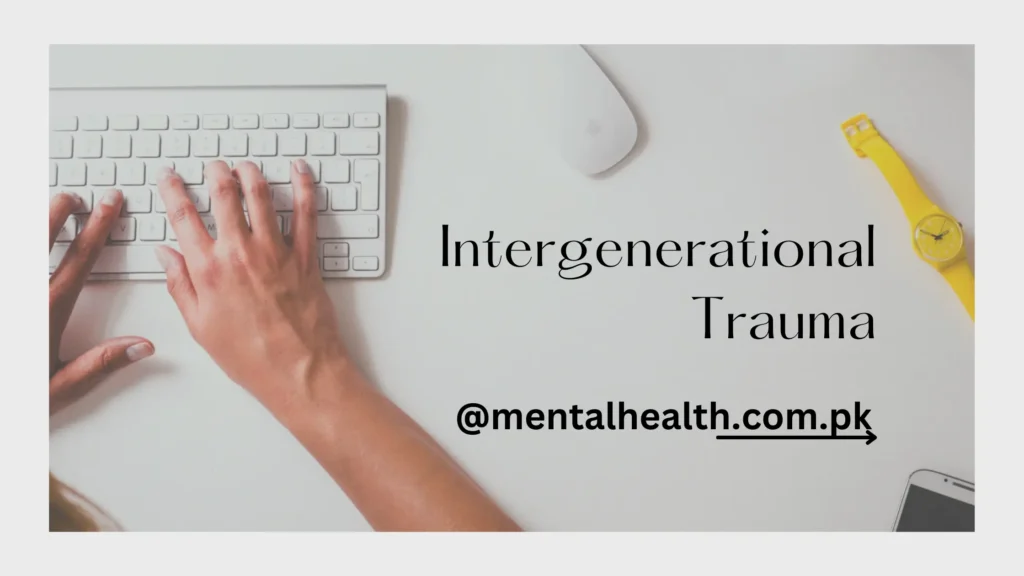Intergenerational trauma, also known as transgenerational or multigenerational trauma, refers to the psychological effects of trauma that are passed down from one generation to another. This type of trauma can stem from various sources, including war, genocide, slavery, and systemic oppression. The effects of these traumatic experiences can profoundly impact not only those who directly experience them but also their descendants, creating a legacy of trauma that persists across generations. Understanding intergenerational trauma is essential for breaking the cycle of pain and fostering healing.
What Is Intergenerational Trauma?
Intergenerational trauma occurs when the impact of a traumatic event experienced by one generation is transferred to subsequent generations. This transfer can happen through a variety of mechanisms, including family dynamics, social environments, and even biological factors. For instance, the children of Holocaust survivors or individuals from communities affected by slavery may experience psychological distress related to their ancestors’ experiences, despite not having lived through the events themselves.
The trauma can manifest in various ways, such as emotional difficulties, mental health issues, and behavioral problems. These manifestations are often subtle and can be challenging to recognize, making intergenerational trauma a complex and pervasive issue.

The Mechanisms of Transmission
Intergenerational trauma can be transmitted through several mechanisms:
- Parenting and Family Dynamics: Traumatized parents may unconsciously transmit their trauma to their children through their parenting style. For example, a parent who has experienced significant trauma may struggle with emotional regulation, leading to an environment of instability and unpredictability for their children. These children, in turn, may develop similar emotional difficulties, perpetuating the cycle of trauma.
- Social and Cultural Transmission: Traumatic experiences can also be passed down through cultural narratives and social norms. Communities that have collectively experienced trauma, such as indigenous populations or marginalized groups, may maintain a shared sense of loss, grief, or anger that is communicated to younger generations. This collective memory can shape the identity and worldview of subsequent generations, influencing their emotional and psychological well-being.
- Biological Factors: Emerging research suggests that trauma can be transmitted biologically through epigenetic changes. Epigenetics refers to the study of how behaviors and environments can cause changes that affect the way genes work. Traumatic experiences can lead to changes in gene expression that may be passed down to offspring, potentially predisposing them to mental health issues such as anxiety, depression, or PTSD.
Effects of Intergenerational Trauma
The effects of intergenerational trauma are far-reaching and can impact various aspects of an individual’s life. These effects may include:
- Mental Health Issues: Individuals affected by intergenerational trauma may experience a range of mental health issues, including depression, anxiety, PTSD, and substance abuse. These issues can be exacerbated by the trauma-related behaviors and attitudes modeled by previous generations.
- Behavioral Problems: Trauma can also lead to behavioral problems, such as aggression, difficulty forming relationships, and a heightened stress response. These behaviors may be a result of learned patterns from previous generations or a response to the emotional environment created by unresolved trauma.
- Identity and Self-Perception: Intergenerational trauma can significantly impact an individual’s sense of identity and self-worth. Descendants of traumatized individuals may struggle with feelings of guilt, shame, or confusion about their place in the world. This internal conflict can lead to a fractured sense of self and difficulty navigating personal and social relationships.
- Physical Health: The effects of trauma are not limited to mental health. Chronic stress and unresolved trauma can contribute to physical health issues, such as cardiovascular disease, autoimmune disorders, and chronic pain. These health problems may be exacerbated by the inherited stress responses and coping mechanisms passed down through generations.
Recognizing and Addressing Intergenerational Trauma
Recognizing intergenerational trauma is the first step toward healing. Understanding the history and context of the trauma experienced by previous generations can provide insight into the patterns of behavior and emotional responses observed in subsequent generations. However, recognizing the trauma is not enough; it must be addressed through intentional healing practices.
- Therapy and Counseling: Professional therapy is a critical component of addressing intergenerational trauma. Therapeutic approaches such as trauma-focused therapy, family therapy, and EMDR (Eye Movement Desensitization and Reprocessing) can help individuals process and heal from the trauma passed down to them. Therapy can also provide tools for breaking the cycle of trauma, empowering individuals to create a healthier environment for future generations.
- Cultural Healing Practices: For many communities, cultural healing practices play a vital role in addressing intergenerational trauma. Rituals, storytelling, and community gatherings can provide a space for collective healing and the reclamation of cultural identity. These practices can help individuals reconnect with their heritage and find strength in their cultural roots.
- Education and Awareness: Raising awareness about intergenerational trauma is crucial for breaking the cycle of pain. Educating individuals and communities about the signs and effects of intergenerational trauma can foster empathy and understanding, reducing stigma and encouraging those affected to seek help.
- Building Resilience: Building resilience is key to overcoming intergenerational trauma. Resilience can be fostered through strong social connections, positive coping mechanisms, and a sense of purpose. By developing resilience, individuals can better navigate the challenges posed by their inherited trauma and create a more positive future for themselves and their descendants.
Healing and Moving Forward
Healing from intergenerational trauma is a complex and ongoing process. It requires a multifaceted approach that addresses the emotional, psychological, and cultural dimensions of trauma. By recognizing the impact of trauma on their lives and taking proactive steps toward healing, individuals can break the cycle of trauma and pave the way for healthier future generations.
The journey toward healing may involve therapy, community support, and cultural practices that honor and address the trauma of the past. It also involves a commitment to self-care, self-compassion, and the ongoing work of personal growth. As individuals heal, they can transform the legacy of trauma into one of resilience, strength, and hope.
Conclusion
Intergenerational trauma is a profound and pervasive issue that affects many individuals and communities. By understanding the mechanisms of transmission, recognizing the effects, and taking steps to address and heal from this trauma, individuals can break the cycle and create a healthier future for themselves and their descendants.

